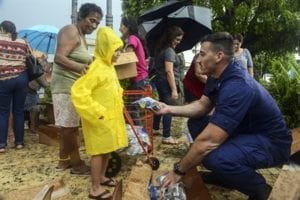Contributed by Mónica Rivera-Rosado
We are a group of NYU Environmental Conservation Education Students and Alumni who are spearheading a relief effort to Puerto Rico along with support from NYU’s Department of Teaching and Learning faculty and staff. We are launching this effort to help alleviate the crisis in some of Puerto Rico’s most remote and hard-hit communities, while promoting sustainability and building resilience.

The aftermath of Hurricane María in Puerto Rico has resulted in loss of power to the entire island, leaving 3.4 million U.S. citizens in the dark, without electric power or drinking water and no effective means of communication. As environmental educators, we recognize the importance of fostering human health, environmental protection, and resiliency. Our relief effort will focus on providing high-need communities with solar charging devices and water purification kits.
Read more



